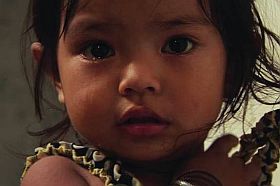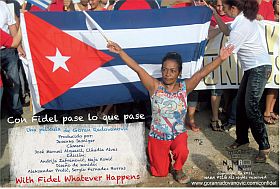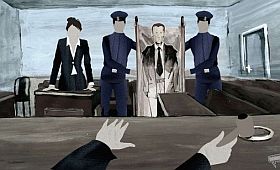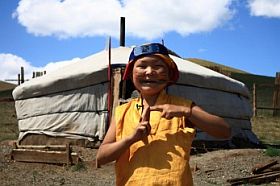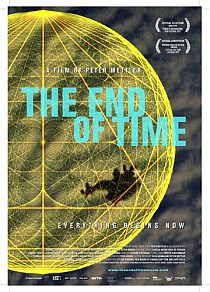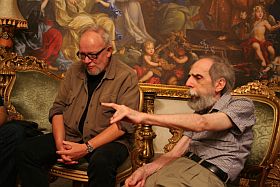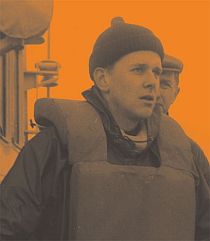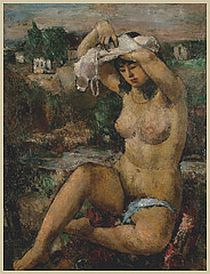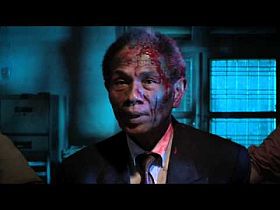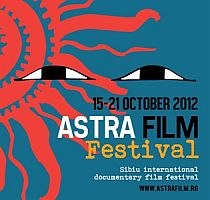Præsten i Vrensted, Karsten Erbs, havde den torsdag i oktober 2012 inviteret pensionistforeningen og alle ældre til en eftermiddag i præstegården. Han skrev på sin hjemmeeside, at noget særligt havde været på færde: ”Vi havde bagt boller og lavet lagkage. Og det blev et rigtig godt kaffebord, men eftermiddagen blev rigtig god også fordi jeg viste to små film af Jørgen Vestergaard om Hanstholm. De to film var Vagt ved Havet (1965) og Havnen (1967). To meget fine dokumentarfilm. Det er instruktøren på billedet under optagelserne i 1965 (FOTO, red.). Og naturligvis så vi billeder fra vores bustur til Hjerl Hede.”
Ja, det er nemlig to meget fine dokumentarfilm, og det er stærkt, at de stadigvæk formidles og ses og netop som de er lavet, med den dybt rodfæstede indsigt i egn, og folk og sprog og selvforståelse, udfordre og bekræfte et publikum med så udbygget konsekvensekspertice som den ved kaffebordet i Vrensted i torsdags. Vestergaards film lever og godkendes hver eneste gang.
SOMMERHESTE (1964) og LANDSBYEN LEVER (1990)
Det er så godt, at Jørgen Vestergaard sørger for at få sine mange vigtige film fra en lang og i ordets forstand enestående produktion ud på dvd. For disse film har alle årene været noget helt for sig selv, og de vil blive stående som enestående. Som en særlig filmkultur, han er alene om. I hvert fald på det niveau. En kultur i landets midte, som journalister og politikere for tiden kalder nationens udkant.
Jeg glædede mig oprigtigt til at se de to gamle film, da de ankom i den nye kassette. Jeg gik gennem udenværkerne af aktualitet og journalistik og pædagogik fra dengang, de blev lavet, direkte ind i de dejlige dele. Først og fremmest ind til de medvirkende og deres sprog, sætninger, ord og kultur, som var min i min barndom, i min ungdom, dengang. Her til stede i et dokumentarisk arbejde og fastholdt, så det er en udfordring til den kultur, det samvær, som omgiver mig i dag. Ved siden af sprogets dokument er der i Vestergaards film altid, og altså også her, filmfotografiets dokument, som altid og også her er selvfølgeligt, smukt og autentisk. Orla Nielsen har fotograferet Landsbyen lever og Lennart Steen har fotograferet Sommerheste. De har været med fra begyndelsen, Sommerheste fra 1964 er Vestergaards første rigtige film, som han så indforstået præcist skriver i kassettens teksthæfte.
Men, men, jeg må også være skrap. Der er altså noget, der forstyrrer. Det er disse udenværker. Jeg er ikke sikker på, om de altid har forstyrret. Men nu forhindrer de mig i hvert fald i uden grums i linserne at se værkernes rene filmiske indre søjle af uangribelighed. Konkret liste: Gunnar Iversens nok alt for villede speak, Jens Okkings mærkeligt distanceret nedladende indtaling, Peter Watkins-rammen af propaganda drama-dok i Landsbyen lever, som ellers er tidløs dokumentarisme, og så hele børnefilm-historien, som er klodset ramme om den fineste film pure i Sommerheste.
Begge film er altså en del, og til dels forstyrrende, præget af den tid hvori, og af de formål hvortil, de blev lavet, og jeg kan ikke frigøre mig fra den tanke, at en nybearbejdning kunne have forbedret dvd-udgivelsen betydeligt, idet det så havde været muligt at skrælle ind til de to værkers sikre kerne af umistelig dokumentarisk og filmisk værdi. Den er der selvfølgelig nu, inderst inde og helt sikkert, men der meget omkring, som forstyrrer et blik, som så gerne vil se filmens kunst.
Men, men. Der er jo de uforfalskede og ægte talende mennesker i landsbyerne, og der er især, især det fine lille stykke filmlyrik om de dejlige heste, som dengang var så talrige og vigtige, men som netop disse år udvandrede sammen med bønderne. Som Knud Sørensen skildrer det: ”… Forholdet mellem mænd og heste er naturligt. 1 mand til 2 heste. Et hestespand. Forestiller man sig nu disse 295.000 overflødige mænd (så mange forsvandt fra landbruget mellem 1942 og 1975) med deres overflødige heste på vej ud af dansk landbrug, f. eks. ud over den dansk-tyske grænse ved Kruså, så må man forestille sig en næsten uendelig række af mænd og heste, ned gennem Holsten, forbi Hamburg, videre ad motorvejene forbi Frankfurt, forbi Basel, over Sct. Gotthard, de når Milano, fortsætter, fortsætter, og i det øjeblik første mand drejer ind på Peterspladsen i Rom, forlader sidste mand grænsestationen ved Kruså…” (Beretninger fra en dansk udkant 1978) (Blogindlæg 10-12-2010, Allan Berg Nielsen)
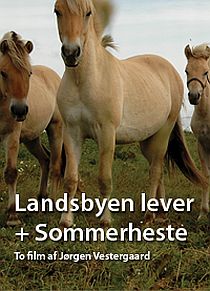
VAGT VED HAVET (1965), HAVNEN (1967) og HANSTHOLM (1970)
Jørgen Vestergaard er en af dansk dokumentarfilms absolutte hædersmænd. Det er altid i orden, hvad han leverer. Fine, varme beskrivelser af mennesker udenfor hovedstaden og af miljøer, som vi københavnere ser alt for lidt til. Nu drejer det sig om Hanstholm, som instruktøren har lavet en halv time lang film om med titlen “Hanstholm – historien om en havn”. Arkiv, interviews, nutidige optagelser – som sædvanligt lavet af Orla Nielsen – og en nænsom speak, som tager os ved hånden.
Det er alt sammen gedigen oplysning og når man så ovenikøbet på samme dvd får (instruktørens beskedne ord) “fire ældre film om Hanstholm” med som bonusmateriale, så er der også tid til lidt sød dansk dokumentarfilmhistorie.
Lad mig nævne to af dem: Vagt ved havet fra 1965, produceret for Dansk Kulturfilm, vidunderligt fotograferet af Lennart Steen og Havnen, det 10 minutter lange øjebliksbillede fra 1967, ligeledes med Steen bag kameraet. Produceret for Kortfilmrådet. Oh, disse smukke sort-hvide billeder.
For folk der ikke har denne professionelle skavank er denne dvd et flot lille stykke danmarkshistorie med et vedlagt hæfte, der giver baggrundsinformation. (Blogindlæg 06-12-2007, Tue Steen Müller)
RITUALER (2013)
Måske er det rigtigt, måske betragter Jørgen Vestergaard sine danskere i sine danske film etnografisk / socialantropologisk, som var det et eksotisk folk, han gennem årene i sit værk er kommet udefra til og har beskrevet. Nu har han i hvert fald – i sig selv prisværdigt – fået digitaliseret og udgivet yderligere tre film på en dvd med overskriften ”Ritualer”. Den snævre term lægger et underfundigt fagligt fortolkende blik ned over de tre meget forskellige film, som ellers har folkeligt imødekommende talemåder som titler, ganske anderledes bredende sig ud. Lad os se på det:
DENGANG JEG DROG AFSTED (1970)
Naturligvis har filmen mistet sin værdi som faktuel information til resten af samfundet om de første uger som indkaldt værnepligtig. Men jeg tror egentlig heller ikke det var alvorligt ment dengang, dette samfundsrelevante. Det er så tydeligt en film, som er optaget af sig selv og lukker sig om sig selv som underholdning. Ja da, den er tidsbundet også i det, vi ser på billederne: påklædning, frisurer, sprog og udtale. Men dens vigtigste tidsbundne egenskab er dens måde at være filmværk på. Den er simpelthen sin tid. Sådan lavede man film dengang. For eksempel klippede man tilbageholdt ironiserende, sådan lidt klemt. Det lille smil lige før fniset. Først marchmusik til de marcherende rekrutter, så den samme march til kameraets køretur langs køjerne med alt grejet lagt frem på madrasserne, ens fra madras til madras, naturligvis og på samme møde køreturen langs kapperne på knagerækkerne. Sådan var den underholdende tankegang, dengang. Billedbeskæringer, – opbygninger og -lysfordeling er så solidt forbundet med sin tid og især sine nærmeste æstetiske forbilleder fra årene før. Sådan lavede man forfilm til biografen dengang. Det var det filmiske håndværk. Solidt. Der er langt til ”Armadillo”, men om et par årtier formodentlig ikke. Det er filmhistorie.
DEN STORE DAG (1975)
Der er gået fem år. Måden at lave film på har ændret sig, Jørgen Vestergaard har ændret sig. Er blevet ældre, alvorligere, modigere. Filmen handler om konfirmation, og det gør den vederhæftigt. Men ikke kun det, den vover at trække det eksistentielle tema i emnet frem, accentuere det. Først og fremmest ved valget af de to rigtig gode medvirkende præster. Dernæst ved at lukke filmpoesien ind i en række faktisk uforglemmelige scener, som skildrer troen, så vi forstår den. Hvad vi jo ikke gør, når der tales om den i skolegården. Altså første poetiske chok: præstens foldede hænder, han beder roligt og tydeligt fadervor. Nærbilleder af børnene omkring ham i konfirmandstuen. Deres alvor. Andet: et barn læser ritualet for konfirmation højt fra salmebogen, sammenstødet mellem den præcist voksne tekst og den søgende, famlende stemme. Bedre forklaring på, hvad konfirmation er, kan en film ikke give. Tredje poetiske chok: børnene tumler jublende ned ad en grøn fri moræneskrænt, deres præst har taget dem med til en Ingemannsk eng. De skal se skaberværket, tale om skaberværket. Og der står han, præsten i lodenfrakke og alpehue, mellem de kulørte børn og taler forbavsende klart om det hele. Fra den mindste orm, som ligger hernede, op over træer og bakker mod skyerne og planeterne og ud i galakserne, han peger og vi forstår. Sådan tør Vestergaard lave film midt i halvfjerdserne. Og selvfølgelig er der på den halve time plads til suppe, steg og is og hvad der ellers hører en konfirmation til.
TIL DØDEN SKILLER JER AD (1978)
Sådan er det så nok også med bryllupsfilmen tre år senere? Men nej, slet ikke! Præsterne mangler og børnene er blevet voksne, og nu er tro noget man debatterer og det der med moderne menneske, og af hensyn til faderens rettighed til børnene er det fornuftigt at blive gift, og hver anden unge kvinde vil så helst være hvid brud i en kirke. Og mens jeg ser filmen underbygges det, og det kan jeg så godt forstå. Borgerlig jura over for kirkelig jura. Filmen mangler imidlertid den tyngde af alvor og eksistens-opmærksomhed, som konfirmationsfilmen drejer sig om. De medvirkende fire, som skal giftes er for sikre på sig selv, ikke til at ryste. En gentagelse af grebet fra konfirmationsfilmen mislykkes, hun skal læse en tekst fra biblen, og det er smukt. Men så siger hun, at hun har valgt den, og jeg ved, det er den almindeligste tekst til bryllup i kirken overhovedet, 1. korinterbrev, kapitel 13, som endvidere jo er Paulus’ og ikke Jesus’ tekst, hvad hun vist tror. Præsterne skulle vist ikke have sluppet konfirmanderne, de børn er ikke blevet i troen, end ikke i kulturen. Og Vestergaard accepterer det, han former det ikke. Noget er sket på de tre år. Er det alligevel journalistikken i ham som vinder over poesien? Eller er det udefra kommende krav til danske dokumentarfilm? Pædagogiske krav? Er det nu omkring 1980, at dokumentarfilm alene betragtes som undervisningsmateriale? Og så er poetisk alvor ikke varen? Men selvfølgelig er der, som der altid er hos Vestergaard scener fra de steder, hvor arbejdet det rigtige arbejde foregår, sangskrivernes spiseborde, hvor versene bliver til og kogekonernes komfurer, hvor de tusinder suppeboller formes. Der er meget studium i hans film, og så enkelte punctum. Tue Steen Müller udpeger i den ledsagende katalogtekst sådan et: ”… de to glade mænd, der står og danser i forsamlingshuset, hvor kirkebrylluppet bliver fejret. Den ene med et glas i hånden, den anden med en flaske. En detalje måske, men det er dem, der skaber en filmisk fortælling.”
”Dengang jeg drog af sted”, 1970, Danmark, 11 min., ”Den store dag”, 1975, Danmark, 33 min. og ”Til døden skiller jer ad”, 1978, Danmark, 34 min. Samlet på én dvd, ”Ritualer”, 2013, Danmark. Distribution: vestergaard.film@gmail.com (ABN, blogindlæg 3. januar 2014 )
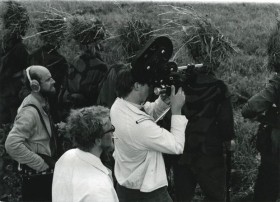
Foto: Jørgen Vestergård og holdet på optagelse til ”Dengang jeg drog af sted”(1970)
STORM P. OPFINDELSER (2001)
Selvfølgelig har jeg altid spekuleret på, om Storm P. opfindelserne ville virke, hvis de blev bygget. Det gør de! For nogle år siden satte Jørgen Vestergård nogle dygtige folk til at bygge dem i sit værksted. Og de lavede dukkerne, som maskinerne skulle bejene, og som skulle betjene maskinerne. Alt virkede! Bitte små og enkle opgaver blev løst på den mest komplicerede måde, tænkes kan. Alt i dyb, dyb alvor, med en vedvarende boblende, men al tid omhyggeligt tilbageholdt latter. Fastholdt af Henrik Koefoeds knastørre læsning af Storm P.’s tekniske forklaringer til maskinerne.
Filmen er en suite af ti små episoder, hver med en opfindelse på det alleromhyggeligste skildret af dukkefilmmesteren (hvad han altså også er…) Jørgen Vestergård. Den er i hans stædige arbejde med at få alle sine film ud på DVD gjort tilgængelig ved at Storm P. Museet til sin butik så forståeligt har bestilt et antal kopier. Køb den der, den er i hvert fald pengene værd, hører hjemme i samlingen, har gemmeværdi som det stykke gedigne frederiksbergske kultur det er. Fortolket af en thybo. (Blogindlæg 26-09-2009, Allan Berg Nielsen)
ET RIGTIGT BONDELIV (1994)
Nogle af Jørgen Vestergaards film er simpelthen umistelige. Blandt disse først og fremmest hans mesterværk Et rigtigt bondeliv. Som altid har Vestergaard taget sagen i sin egen hånd og nu fået også den ud på dvd som led i et stort genudgivelsesprojekt. Det er så godt. Og gensynet med den 15 år gamle film er gribende. Det er jo en stor, en omfattende, men også præcist lavmælt elegi over en vældig kulturs sidste årtier i midten af 1900-tallet.
Det første jeg hæfter mig ved, er de medvirkendes aldeles usentimentale munterhed. Dernæst ved deres vedkommende viden om tingene og nøjagtighed i hver oplysning, i hvert udsagn. Vestergaards værk rejser sig som monument ved sin uhyre omfattende og detaljerede research. Her er noget så sjældent som ordentlig besked om tingene, og arkivmaterialet er på plads. Det, der tales om, er det, som indklippet viser. Det er frydefuldt. Grønthøster og Ferguson. Møgspredning og roehakning. Faglig og nøgtern præcision.
På dvd-en ledsages bondefilmen af den på mærkelige måder noget svagere Fjordfiskerne og den i mine øjne mislykkede Brødre. Den første lider under tydelige ambitioner om større tv-relevans. Om det er pålagte eller selvpåtagne begrænsninger er ikke klart, men så kompromisløs som Et rigtigt bondeliv er den ikke. Værre er det med Brødre, hvor Tue Steen Müller (dengang SFC programredaktør) foreslog at optage den uden dialog! Dels er de to medvirkende ikke meget uden deres særlige sprog som bærer af en særegen livstolkning, dels er det vestjyske sprog nok selve sammenhængskraften i Vestergaards sørgesange over denne egns forsvundne bonde- og fiskerliv. Og skildringen af de to fine mænd i den smukke gård fungerer slet ikke som billeddigt. Heldigvis findes der flere dages optagelser med de to brødre. Med dialog på vestjysk fra Holmsland. Der ligger i det materiale en film og venter på Jørgen Vestergaards energiske dvd-projekt, som han egenhændigt så prisværdigt fører ud i livet: samling på det samlede værk. (Blogindlæg 17-09-2009, Allan Berg Nielsen)

JENS SØNDERGAARD (1995)
Det begynder med en rekonstruktion af Søndergaards billede med Sankt Hans bål på Bovbjerg. Man kigger lidt, det er tæt på, det er for meget, nej, det er netop så fint, at det ikke bliver for meget, statisterne er netop de mennesker, det drejer sig, sådanne, som har et fortroligt forhold til maleren og hans farvekraft ad helvede til. Konventionen udvandes ikke i sentimental historieformidling, den bruges med forsigtighed og egenartet beslutsomhed. Men det er en konventionel film, skitse til et portræt ved en række interviews med mennesker, som kendte ham og egnene omkring ham og billederne efter ham. Men resultatet, kernen i værket er ukonventionelt. Vestergaard har samlet en ganske særlig lille gruppe medvirkende, ukonventionelle eksperter. De er ikke kunsthistorikere, de er i nær familie med de billeder, i slægt med de mennesker, som befolker hvert eneste af Søndergaards lærreder. Det giver deres fortællinger og meninger en helt særlig tone af fortrolighed, levet indsigt og autentisk dybde. Det er som modellerne træder ud af rammerne og med sprog bare er de penselstrøg, hvormed Vestergaard maler sit filmportræt. (ABN 14.10.12)
AT VÆRE SIG SELV
Utrættelige Jørgen Vestergaard har lavet en film om ”Kirsten Kjær og hendes museum” i Langvad ved Frøstrup. Den varer 33 minutter og lader kunstnerens nevø, Harald Fuglsang fortælle historien om en farverig og kontroversiel personlighed, hvis mange portrætmalerier kan beses på museet, eller rettere kunstcentret, som Fuglsang kalder det sted som han og vennen John Anderson har skabt, hvor der betales entré efter behag og hvor der nu også er et specielt koncerthus at finde.
Filmen giver god besked og viser rundt, og Vestergaard skal have ros for at have sat tre andre film på dvd’en – filmen om Ovartaci fra 1998, portrættet af Jens Søndergaard fra 1995 (hvori salig Flemming Madsen fra vor tv-barndom optræder) og endelig Cementkrucifikset fra 1968 om pastor Anton Laier med stemme og kommentar af vidunderlige Broby-Johansen.
4 film om kunstnere fordelt over 40 år, blot en lille del af Vestergaards omfattende filmografi. (Blogindlæg 01-12-2008, Tue Steen Müller)
Jeg har nu omsider lånt dvd-udgivelsen på biblioteket og lavet min egen lille Jørgen Vestergaard-sommer bio reprise og får lyst til at knytte en kommentar til. Og jeg opholder mig som det første begejstret ved den medvirkende Harald Fuglsangs fortælling af Kirsten Kjærs biografi i ét smukt klippet, indsigtsfuldt og så sprogligt musikalsk forløb, at det fastholder og bliver til selve dette liv i dets egen dialekt. Ægte fortællekunst så ansvarsfuldt og beskedent fastholdt på film af Jørgen Vestergaard og hans faste fotograf Orla Nielsen.
Det er godt at blive mindet om, at Jørgen Vestergård har lavet disse vigtige film, og her på dvd-en har han så med dem sammenfattet skildringen af et særegent stykke jysk kulturhistorie. Han har fastholdt Jens Søndergaards bål på Bovbjerg og stille og roligt placeret Bjerre og Lergaard og Hoppe i den sammenhæng. Han har bevaret Broby-Johansens suveræne fortælling om Anton Laier og omgivelsernes uforstand og brutalitet, så det skærer i hjertet. Formidlet Johannes Nielsens omhyggelige notater af Overtacis udtalelelser i de besynderligt præcise sætninger og endelig altså Fuglsangs mundtlige Kirsten Kjær biografi, som var en myte blandt museets kendere. Nu er den et tilgængeligt og autentisk værk.
Omkring disse dokumenter på det jyske sprog i det jyske sind har Vestergaard komponeret sine fire film om at være sig selv, blive sig selv. Med beskedenhed og loyalt, loyalt… Det skal han bare have tak for. (Blogindlæg 08-07-2009, Allan Berg Nielsen)
SPILLEMANDEN (2012)
Vestergaard tager igen simpelthen ordet og fortæller en historie. Den her gang om en stor musiker ude på landet, der hvor de bor. Han gør det på den måde, han kan og altid har gjort det på, i en dokumentarfilm, som han bare laver. Han samler pengene sammen, han samler holdet af kolleger og venner og går i gang. Optager og klipper og færdiggør og indtaler sin fortælling voice over. Det er sådan han tager ordet, og jeg bliver så glad, når jeg igen hører hans stemme fortælle om det, han nu er optaget af. Det gik sådan til, at Jacob Oschlag fra foreningen Thy Folkemusik pegede på en fortsættelse af filmene om Evald Thomsen, Evald og Ingeborg og alle de andre (1974) og om brødrene Ejnar, Hans og Karl Nielsen fra Oksbøl, Æ Tinuser (1979). Han skulle lave en film med Karl Skaarup.
Filmen er for så vidt om ham, spillemanden Karl Skaarup (1924) fra Koldby i Thy, men den er mere end det, den er en film om musik, og den er derfor især med ham som medvirkende, han fortæller skam lidt om sig selv og sit liv, men vigtigst, han forklarer fagligt og omhyggeligt om sin musik i ellers ubeskrevne detaljer, om sine forbilleder og om sin undervisning, som han sent i karrieren med succes blev lokket ud i af en ny generation af musikere. Filmen er om musik og musikalske generationsskifter uden egentlige brud, men med traditioner og videreførelser og fornyelser. Og så om den personlige faktor: det drejer sig her om Karl Skaarup. Og den loyale, klassiske tv-dokumentar udvider sig, ja, Skaarup fortæller, som han forventes, om gamle dage og missionens syn på hans fag i dans og alkohol og hans myndige dialekt slår fast: det er ikke synd. Men han bliver faglig i sin selvbiografi, holder sig til instrumenternes række, fortæller om dem, han har ejet siden barndommen. Og så kommer det interessante, musikken. Han lærte at se på de dansende, skille de dygtigste ud og spille efter dem, for dans og musik hører sammen, i hans verden i den rækkefølge. Sådan er kunsten.
Filmens kerne er mødet mellem Karl Skaarup og violinisten fra konservatoriet, Kristian Bugge, mødet mellem erfaring og begejstring. Bugge overtaler Skaarup til at tage sig som elev, og efterhånden bliver Skaarup en slags ekstern lærer ved Fyns Musikkonservatorium. Selv havde han lært af violinisten Viggo Post fra Bedsted, og han kunne så videreføre kendskabet til de lange, lange thyske turdanse i akademiske rammer, men ikke kun denne folkloreindsamling, han tilføjede og fortsætter med at tilføje sin egen kunst, det gammeldags på den autentiske, den ægte måde. Musikken er levende, variationerne udvides med improvisationer, som i opmærksomhed på dansen stadig understreger denne. Dette er Vestergaards films fornemhed, klippet følger og illustrerer konkret i dejligt lange scener uden nogen fotografisk eller klippeteknisk pynt, at Karl Skaarup samler en stil omkring sig, en musikalsk skole velsagtens, der som hovedingrediens er afhængig af og respekterer, hvad folk gør, når de danser, og af, hvad de simpelthen kan lide.
Jørgen Vestergaard har lavet en film om og en udforskning af en stor musikalsk tradition i sin værkrække, endnu en fint følt film om kunst. Direkte gribende er det at overvære den gamle musiker lytte sig opmærksomt ind i et ungt orkester, Habadekuks fremmede musik og lidt efter lidt spille sammen med dem, senere at se ham give koncert for 400 alvorligt lyttende tilhørere i Vestervig Kirke, koncert, ja! Både spillende med i stort orkester og som solist med fuldstændig stilhed omkring sig og sin harmonika.

Jørgen Vestergaard: Spillemanden – en film om Karl Skaarup, Danmark 2012, 39 min. Fotografi: Orla Nielsen, lyd: Erik Nielsen, klip: Henrik Jørgensen, musik: Karl Skaarup, Kristian Bugge og Habadekuk, idé: Jakob Oschlag, produktion: JV film & tv, salg: Forlaget Knakken orpo@thisted.dk
SAMLEDE VÆRKER
Når der er kræfter (sponsorer eller store distributører) bag, kommer dvd-boksene med de berømte navne og titler, og det fint nok. Når der er vedholdende vilje bag, kommer de andre film også, men enkeltvis eller blot samlet et par stykker på en enkelt dvd i almindelige kassetter. Men uanset udgivelsesmåden samler de sig ved siden af hinanden på reolen, disse værkrækker af instruktør efter instruktør.
Jørgen Vestergaard og hans forlag på biblioteket i Thisted sørger efterhånden for at få hans samlede værk ud på dvd. Det fylder mere og mere helt til højre på hylden. Under bogstavet V ude ved von Trier og Westerlund. Vestergaard fylder lidt efter lidt meget på hylden, og især fylder hans samlede værk sin plads i den danske filmlitteratur, hvor han, som naboerne deres, dominerer sin niche med gedigen kvalitet og faktisk sjældenhed. Umistelig. Disse dvd’er er nu til at få fa i:
Jørgen Vestergaard: Hanstholm – historien om en havn (1970), på dvd’en findes også Vagt ved havet (1965), Havnen (1967) og Kanonen (2005)
Jørgen Vestergaard: Sommerheste, 1964, 23 min. Manuskript: Jørgen Vestergaard, fotografi: Lennart Steen, indtaling: Carl Ottosen, klip: Jørgen Vestergaard, lyd: Kjell Bjørlie, musik: Bent Axen.
Jørgen Vestergaard: Landsbyen lever, 1990, 44 min. Manuskript: Gunnar Iversen, fotografi: Orla Nielsen, indtaling: Jens Okking, klip: Jørgen Vestergaard, lyd: Kristian Bro og Kjell Bjørlie, musik: Kenneth Knudsen, Ole Theill og Mikkel Nordsø.
Jørgen Vestergaard: Et rigtigt bondeliv, 1994. 59min. Fjordfiskerne, 1996, 55 min. Brødre, 1996, 11 min. With English subtitles.
Jørgen Vestergaard: Storm P. Opfindelser, 2001, 15 min. English subtitles. JV Film & TV og Tinderbox. DVD’en kan købes på Storm P. Museet http://www.stormp-museet.dk/index.html
Jørgen Vestergaard: Viljen til Thy (2005), en beskrivelse af forandringsprocessen i Thy i perioden fra 1970 til 2005.
Jørgen Vestergaard: Kirsten Kjær og hendes museum, 2008, 33 min. I DVD-udgivelse sammen med Vestergaards tidligere kunstnerfilm, Cementkrucifikset, 1968, 17 min., Jens Søndergaard, 1995, 33 min. og Ovartaci, 1998, 24 min.
Alle filmene er produceret af Jørgen Vestergaard Film. Salg og distribution: Forlaget Knakken, 7700 Thisted. E-mail: orpo@thisted-bibliotek.dk Tlf: 45 9917 2843. English subtitles available.
SPILLEMANDEN (2012)
Vestergaard tager igen simpelthen ordet og fortæller en historie. Den her gang om en stor musiker ude på landet, der hvor de bor. Han gør det på den måde, han kan og altid har gjort det på, i en dokumentarfilm, som han bare laver. Han samler pengene sammen, han samler holdet af kolleger og venner og går i gang. Optager og klipper og færdiggør og indtaler sin fortælling voice over. Det er sådan han tager ordet, og jeg bliver så glad, når jeg igen hører hans stemme fortælle om det, han nu er optaget af. Det gik sådan til, at Jacob Oschlag fra foreningen Thy Folkemusik pegede på en fortsættelse af filmene om Evald Thomsen, Evald og Ingeborg og alle de andre (1974) og om brødrene Ejnar, Hans og Karl Nielsen fra Oksbøl, Æ Tinuser (1979). Han skulle lave en film med Karl Skaarup.
Filmen er for så vidt om ham, spillemanden Karl Skaarup (1924) fra Koldby i Thy, men den er mere end det, den er en film om musik, og den er derfor især med ham som medvirkende, han fortæller skam lidt om sig selv og sit liv, men vigtigst, han forklarer fagligt og omhyggeligt om sin musik i ellers ubeskrevne detaljer, om sine forbilleder og om sin undervisning, som han sent i karrieren med succes blev lokket ud i af en ny generation af musikere. Filmen er om musik og musikalske generationsskifter uden egentlige brud, men med traditioner og videreførelser og fornyelser. Og så om den personlige faktor: det drejer sig her om Karl Skaarup. Og den loyale, klassiske tv-dokumentar udvider sig, ja, Skaarup fortæller, som han forventes, om gamle dage og missionens syn på hans fag i dans og alkohol og hans myndige dialekt slår fast: det er ikke synd. Men han bliver faglig i sin selvbiografi, holder sig til instrumenternes række, fortæller om dem, han har ejet siden barndommen. Og så kommer det interessante, musikken. Han lærte at se på de dansende, skille de dygtigste ud og spille efter dem, for dans og musik hører sammen, i hans verden i den rækkefølge. Sådan er kunsten.
Filmens kerne er mødet mellem Karl Skaarup og violinisten fra konservatoriet, Kristian Bugge, mødet mellem erfaring og begejstring. Bugge overtaler Skaarup til at tage sig som elev, og efterhånden bliver Skaarup en slags ekstern lærer ved Fyns Musikkonservatorium. Selv havde han lært af violinisten Viggo Post fra Bedsted, og han kunne så videreføre kendskabet til de lange, lange thyske turdanse i akademiske rammer, men ikke kun denne folkloreindsamling, han tilføjede og fortsætter med at tilføje sin egen kunst, det gammeldags på den autentiske, den ægte måde. Musikken er levende, variationerne udvides med improvisationer, som i opmærksomhed på dansen stadig understreger denne. Dette er Vestergaards films fornemhed, klippet følger og illustrerer konkret i dejligt lange scener uden nogen fotografisk eller klippeteknisk pynt, at Karl Skaarup samler en stil omkring sig, en musikalsk skole velsagtens, der som hovedingrediens er afhængig af og respekterer, hvad folk gør, når de danser, og af, hvad de simpelthen kan lide.
Jørgen Vestergaard har lavet en film om og en udforskning af en stor musikalsk tradition i sin værkrække, endnu en fint følt film om kunst. Direkte gribende er det at overvære den gamle musiker lytte sig opmærksomt ind i et ungt orkester, Habadekuks fremmede musik og lidt efter lidt spille sammen med dem, senere at se ham give koncert for 400 alvorligt lyttende tilhørere i Vestervig Kirke, koncert, ja! Både spillende med i stort orkester og som solist med fuldstændig stilhed omkring sig og sin harmonika.
Jørgen Vestergaard: Spillemanden – en film om Karl Skaarup, Danmark 2012, 39 min. Fotografi: Orla Nielsen, lyd: Erik Nielsen, klip: Henrik Jørgensen, musik: Karl Skaarup, Kristian Bugge og Habadekuk, idé: Jakob Oschlag, produktion: JV film & tv, salg: Forlaget Knakken orpo@thisted.dk
RITUALER (2013)
Måske er det rigtigt, måske betragter Jørgen Vestergaard sine danskere i sine danske film etnografisk / socialantropologisk, som var det et eksotisk folk, han gennem årene i sit værk er kommet udefra til og har beskrevet. Nu har han i hvert fald – i sig selv prisværdigt – fået digitaliseret og udgivet yderligere tre film på en dvd med overskriften ”Ritualer”. Den snævre term lægger et underfundigt fagligt fortolkende blik ned over de tre meget forskellige film, som ellers har folkeligt imødekommende talemåder som titler, ganske anderledes bredende sig ud. Lad os se på det:
DENGANG JEG DROG AFSTED (1970)
Naturligvis har filmen mistet sin værdi som faktuel information til resten af samfundet om de første uger som indkaldt værnepligtig. Men jeg tror egentlig heller ikke det var alvorligt ment dengang, dette samfundsrelevante. Det er så tydeligt en film, som er optaget af sig selv og lukker sig om sig selv som underholdning. Ja da, den er tidsbundet også i det, vi ser på billederne: påklædning, frisurer, sprog og udtale. Men dens vigtigste tidsbundne egenskab er dens måde at være filmværk på. Den er simpelthen sin tid. Sådan lavede man film dengang. For eksempel klippede man tilbageholdt ironiserende, sådan lidt klemt. Det lille smil lige før fniset. Først marchmusik til de marcherende rekrutter, så den samme march til kameraets køretur langs køjerne med alt grejet lagt frem på madrasserne, ens fra madras til madras, naturligvis og på samme møde køreturen langs kapperne på knagerækkerne. Sådan var den underholdende tankegang, dengang. Billedbeskæringer, – opbygninger og -lysfordeling er så solidt forbundet med sin tid og især sine nærmeste æstetiske forbilleder fra årene før. Sådan lavede man forfilm til biografen dengang. Det var det filmiske håndværk. Solidt. Der er langt til ”Armadillo”, men om et par årtier formodentlig ikke. Det er filmhistorie.
DEN STORE DAG (1975)
Der er gået fem år. Måden at lave film på har ændret sig, Jørgen Vestergaard har ændret sig. Er blevet ældre, alvorligere, modigere. Filmen handler om konfirmation, og det gør den vederhæftigt. Men ikke kun det, den vover at trække det eksistentielle tema i emnet frem, accentuere det. Først og fremmest ved valget af de to rigtig gode medvirkende præster. Dernæst ved at lukke filmpoesien ind i en række faktisk uforglemmelige scener, som skildrer troen, så vi forstår den. Hvad vi jo ikke gør, når der tales om den i skolegården. Altså første poetiske chok: præstens foldede hænder, han beder roligt og tydeligt fadervor. Nærbilleder af børnene omkring ham i konfirmandstuen. Deres alvor. Andet: et barn læser ritualet for konfirmation højt fra salmebogen, sammenstødet mellem den præcist voksne tekst og den søgende, famlende stemme. Bedre forklaring på, hvad konfirmation er, kan en film ikke give. Tredje poetiske chok: børnene tumler jublende ned ad en grøn fri moræneskrænt, deres præst har taget dem med til en Ingemannsk eng. De skal se skaberværket, tale om skaberværket. Og der står han, præsten i lodenfrakke og alpehue, mellem de kulørte børn og taler forbavsende klart om det hele. Fra den mindste orm, som ligger hernede, op over træer og bakker mod skyerne og planeterne og ud i galakserne, han peger og vi forstår. Sådan tør Vestergaard lave film midt i halvfjerdserne. Og selvfølgelig er der på den halve time plads til suppe, steg og is og hvad der ellers hører en konfirmation til.
TIL DØDEN SKILLER JER AD (1978)
Sådan er det så nok også med bryllupsfilmen tre år senere? Men nej, slet ikke! Præsterne mangler og børnene er blevet voksne, og nu er tro noget man debatterer og det der med moderne menneske, og af hensyn til faderens rettighed til børnene er det fornuftigt at blive gift, og hver anden unge kvinde vil så helst være hvid brud i en kirke. Og mens jeg ser filmen underbygges det, og det kan jeg så godt forstå. Borgerlig jura over for kirkelig jura. Filmen mangler imidlertid den tyngde af alvor og eksistens-opmærksomhed, som konfirmationsfilmen drejer sig om. De medvirkende fire, som skal giftes er for sikre på sig selv, ikke til at ryste. En gentagelse af grebet fra konfirmationsfilmen mislykkes, hun skal læse en tekst fra biblen, og det er smukt. Men så siger hun, at hun har valgt den, og jeg ved, det er den almindeligste tekst til bryllup i kirken overhovedet, 1. korinterbrev, kapitel 13, som endvidere jo er Paulus’ og ikke Jesus’ tekst, hvad hun vist tror. Præsterne skulle vist ikke have sluppet konfirmanderne, de børn er ikke blevet i troen, end ikke i kulturen. Og Vestergaard accepterer det, han former det ikke. Noget er sket på de tre år. Er det alligevel journalistikken i ham som vinder over poesien? Eller er det udefra kommende krav til danske dokumentarfilm? Pædagogiske krav? Er det nu omkring 1980, at dokumentarfilm alene betragtes som undervisningsmateriale? Og så er poetisk alvor ikke varen? Men selvfølgelig er der, som der altid er hos Vestergaard scener fra de steder, hvor arbejdet det rigtige arbejde foregår, sangskrivernes spiseborde, hvor versene bliver til og kogekonernes komfurer, hvor de tusinder suppeboller formes. Der er meget studium i hans film, og så enkelte punctum. Tue Steen Müller udpeger i den ledsagende katalogtekst sådan et: ”… de to glade mænd, der står og danser i forsamlingshuset, hvor kirkebrylluppet bliver fejret. Den ene med et glas i hånden, den anden med en flaske. En detalje måske, men det er dem, der skaber en filmisk fortælling.”
”Dengang jeg drog af sted”, 1970, Danmark, 11 min., ”Den store dag”, 1975, Danmark, 33 min. og ”Til døden skiller jer ad”, 1978, Danmark, 34 min. Samlet på én dvd, ”Ritualer”, 2013, Danmark. Distribution: vestergaard.film@gmail.com
JØRGEN VESTERGAARD 75 år
Cinemateket har tre af Jørgen Vestergaards dokumentarfilm, omtalt her under overskriften ”Ritualer”, på programmet den 19. April i anledning af instruktørens 75 års dag. Instruktøren er selv til stede for at tale om sine film og ikke blot de tre (”Dengang jeg drog afsted”, ”Den store dag” og ”Til døden skiller jer ad”) dokumentarfilm bliver vist, men også hans smukke animationsfilm ”Historien om en moder” er på programmet.
Jørgen Vestergaard har i sin karriere spændt vidt, hans filmografi er imponerende, han har om nogen skildret det Danmark, som så grimt i dag bliver kaldt for ”udkantsdanmark”. Og han er stadig aktiv – arbejder pt på en film om Storm P. Tillykke, Jørgen! (TSM 26-03-2014)
HØJT SKUM 2015

Det drejer sig om et stort anlagt og imponerende biografisk filmessay om skuespilleren, forfatteren, maleren og tegneren Robert Storm Pedersen (1882-1949) og hans kunst. Kunstnerbiografien er en af Jørgen Vestergaards foretrukne genrer, der har været film om malerne Ovartaci, Jens Søndergaard og Kirsten Kjær, musikerne Evald Thomsen og Karl Skaarup, billedhuggeren og præsten Anton Laier. Ærlige, på en smuk måde troskyldige, hver for sig af særlige grunde vidunderlige film.
Storm Petersen skildringen, som nu et stykke tid har kunnet ses i en række biografer slutter sig til rækken. Den er et indforstået arbejde, en skildring af et næsten privat forhold, som medfører en indforstået fortrolighed, som faktisk er venligt så ekskluderende, som når jeg udsættes for fremmede menneskers familiebilleder eller fotos fra rejsen. Jeg kigger fra yderst på stolen høfligt interesseret på Jørgen Vestergaards verden. Og nej, ikke engageret. Og hvad skyldes så det? Nok, tror jeg, at jeg ikke er fortrolig med det gamle København, BT, Peter og Ping i gamle dage, kender ikke Pilestræde og Berlingske, borgerskabets smag og humor. Det har aldrig været en del af min verden.
Fortællerstemmen er (måske kun for mig?) lidt krukket og påpegende, noget nedladende, men nok ægte inden for den etablerede Storm Petersen tradition og for det trofaste publikum fortsat udholdelig. Men den er overtydelig, faktisk ikke i øjenhøjde. Mon med nogen overhovedet? Det mærkelige er, at den taler midt ind i det moderne, om det moderne. Og så kommer Ebbe Rodes sangforeningsformand! Han er moderne og er i min begrænsede erindring helt sin egen tradition, uopslidelig, moderne kunst i kontakt med verdenskunsten, både med Mark Twain og Samuel Beckett tror jeg. Og Storm Petersens egen oplæsning i radioen er vidunderligt moderne, ægte og aldeles udholdelig og holdbar. Og så kommer filmens højdepunkter, dens umistelige tilføjelser til Storm Petersen fortolkningen:
To højdepunkter, Nikolaj Kopernikus’ Dada-rekonstruktion af monologen ”Aakirkeby” og Jesper Asholts absurdistisk insisterende mand på parkbænken. Det er perler af nutidighed, neomoderne (hvis der var noget der hed det), store monologer, støvfri af al hengemt veneration, men resolut understreget af scenernes stiliseringer i setdesign, instruktion af statisterne og af Steen Møller Rasmussens præcise fotografering, som tindrende morsomt tager sig selv så alvorligt, at vidste jeg ikke bedre, ville jeg tro, jeg var til dilettant i vores forsamlingshus.

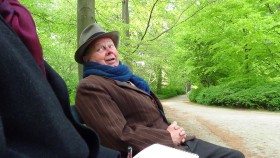
De to scener bringer forfatteren Robert Storm Petersen fortolkningen ud af konventionerne, nøjagtig som filminstruktøren Jørgen Vestergaard gjorde det med sin dukkeanimation fra 2001 af en række af Storm Petersens såkaldte opfindelser. Den geniale lille film, ”Storm P. ’s opfindelser” følger som en helt logisk bonus på dvd-udgaven.
Jeg tror, jeg er uenig med Jørgen Vestergaard og Bo Hr. Hansen i opfattelsen af Robert Storm Petersen, men det er dem, som har undersøgt sagerne, læst bøgene, set billederne, gennemgået arkivet, jeg har selv kun en fornemmelse. Den får mig imidlertid til at tænke, at jeg ville tage ham helt ud af afdelingen for spøg og skæmt, som jeg fornemmer, at Ebbe Rode gjorde, som jeg oplever Kopernikus og Asholt og Jørgen Vestergaard gør i de får scener, og det kan jeg selvfølgelig ikke, men nogen skulle gøre det engang. Og i Storm Petersens sprog ville man måske finde en grundlæggende dansk absurdisme modsvarende den franske. Det bliver en anden gang. Nu er det sådan, at Jørgen Vestergaard har leveret en stor og solid og smuk Robert Storm Petersen filmbiografi på en stolt folkelig traditions sikre grund. Et værk, som vil blive stående og føje sig passende ind i instruktørens samlede værker, som ikke er døgnfluer, men som bliver stående på hylden for at tages ned for gensyn på gensyn. (ABN 20-02-2015)
Danmark 2015, 55 min. With English subtitles
STREAMING
Jørgen Vestergaard film på filmstriben.dk: Et rigtigt bondeliv, Fjordfiskerne, Jens Søndergaard, Ovartaci, Storm P. opfindelser, samt Vindkraft – en dansk historie, Børge Ring, Tommelise, Historien om en moder, Miseri Mø, Morten Maler.



